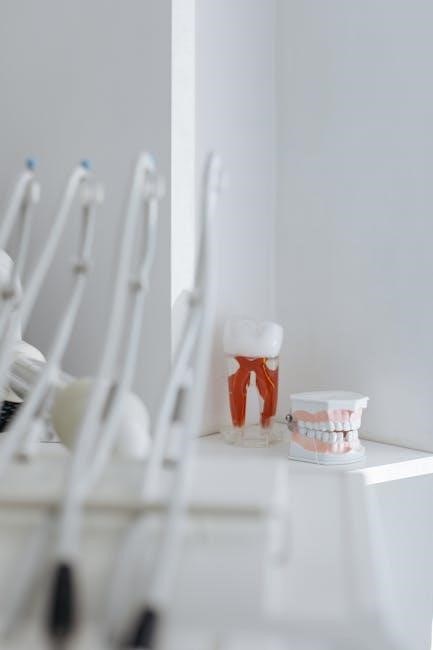post op immediate denture instructions

post op immediate denture instructions
Immediate Denture Care After Surgery
Keep your immediate denture in place for the first 24 hours after surgery to control bleeding and swelling. Avoid removal unless necessary due to excessive bleeding or discomfort.
After 24 hours, remove the denture to clean it with warm salt water. Gently rinse your mouth and reinsert the denture to promote healing and adaptation.
Leaving the denture out at night after the initial healing phase helps the gums rest, ensuring proper fit and long-term comfort.
1.1. Importance of Keeping Dentures in Place
Keeping your immediate denture in place after surgery is crucial for controlling bleeding and minimizing swelling. The denture acts as a protective bandage, promoting healing by stabilizing the surgical site.
Removing the denture too soon can disrupt the clotting process, leading to prolonged bleeding or discomfort. It also allows tissues to swell, which may make reinserting the denture difficult or uncomfortable.
By leaving the denture in place, you help the oral tissues adapt more readily to the new prosthesis, ensuring a smoother recovery and better fit over time.
1.2. Recommended Duration for Initial Placement
The immediate denture should remain in place for the first 24 hours after surgery to aid in healing and minimize complications. This initial period is critical for controlling bleeding and reducing swelling.
After 24 hours, you may remove the denture to clean it, but it should be reinserted promptly to maintain pressure on the surgical site. Continuous wear for the first few days helps the denture act as a protective barrier, promoting tissue adaptation.
Following the first week, your dentist may recommend removing the denture at night to allow the gums to rest, ensuring proper fit and long-term comfort. Adhering to this schedule is essential for a smooth recovery and optimal results.
1.3. Role of Dentures as Protective Bandages
Immediate dentures function like protective bandages after surgery, safeguarding the extraction sites from irritation and infection. They cover the surgical areas, providing a barrier that minimizes discomfort and prevents swelling.
By maintaining consistent pressure, the denture helps control bleeding and promotes clot formation. This protective role is crucial during the initial healing phase, ensuring the gums and bone heal properly and in alignment.
The denture also shields the sensitive tissues from external factors, allowing the mouth to recover without additional stress. This protection is vital for a smooth and uneventful recovery process.

Managing Bleeding and Swelling
Minor bleeding is normal and may last 2-3 days. Biting pressure on the denture helps control bleeding and promotes clotting. Swelling peaks 2-3 days post-surgery and can be managed with ice packs.
2.1. Normal Bleeding Expectations

Minor bleeding is expected after immediate denture placement and may last up to 2-3 days. Oozing around the denture is normal and not cause for concern. The denture acts as a protective bandage, helping to control bleeding and promote clotting. For the first 24 hours, keep the denture in place to minimize bleeding, unless there is excessive bleeding or soreness. Avoid spitting or rinsing forcefully, as this can dislodge clots. Slight bleeding may persist but should decrease gradually. If bleeding becomes heavy or persistent, contact your dentist for advice. Proper care ensures the healing process progresses smoothly.
2.2. Techniques to Promote Clotting
To promote clotting after immediate denture placement, keep the denture in place for the first 24 hours, as it acts as a protective bandage. Gentle biting pressure on the denture can help reduce bleeding and stabilize clots. Avoid spitting, using straws, or rinsing forcefully, as these actions can dislodge clots. Apply an ice bag to the face near the surgical area for 15 minutes at a time to minimize swelling and promote healing. After 24 hours, rinse with warm salt water (1 teaspoon of salt in 8 oz of water) to clean the area gently without disturbing the clots. Proper adherence to these techniques ensures effective clotting and supports the healing process.
2.3. Swelling Management Tips
Swelling is a natural response after immediate denture placement and typically reaches its peak 2-3 days post-surgery. To manage swelling, apply an ice bag to the face near the surgical area for 15 minutes, then remove it for 15 minutes. Repeat this process to reduce swelling. Keep your head elevated, especially while sleeping, to minimize fluid retention in the surgical area. Avoid excessive talking or movements that strain the jaw. Gently rinse your mouth with warm salt water (1 teaspoon of salt in 8 oz of warm water) to cleanse the area without causing irritation. Follow your dentist’s instructions for follow-up appointments to monitor healing progress. These techniques will help reduce swelling and ensure a smoother recovery.

Dietary Recommendations
Stick to a soft diet, avoiding acidic, spicy, and crunchy foods. Opt for yogurt, soup, and mashed potatoes. Proper nutrition supports healing and prevents complications.
3.1. Foods to Avoid in the Initial Healing Phase
Avoid acidic, spicy, and crunchy foods like nuts, chips, and popcorn, as they can irritate the surgical area or dislodge the clot.
- Avoid hot beverages and foods to prevent discomfort.
- Refrain from alcohol and carbonated drinks to minimize irritation.
- Do not consume seeds or sharp-edged foods that could damage the healing tissues.
- Steer clear of straws, as suction can dislodge the clot and delay healing.
- Avoid sneezing through the nose and spitting forcefully to protect the surgical site.
Adhering to these restrictions ensures proper healing and prevents complications during the recovery period.
3.2. Recommended Soft Food Options
During the initial healing phase, opt for soft, non-irritating foods to ensure comfort and proper recovery.
- Yogurt and soft cheeses provide essential nutrients without causing discomfort.
- Soft-cooked vegetables like mashed potatoes and steamed carrots are ideal.
- Scrambled eggs and soft omelets are gentle on the mouth and rich in protein.
- Smooth soups and broths offer hydration and nutrients without irritation.
- Soft fruits like bananas and applesauce are easy to eat and promote healing.
- Ensure foods are at room temperature to avoid discomfort.
These options support healing and minimize discomfort while maintaining proper nutrition.
3.3. Importance of Proper Nutrition
Proper nutrition is crucial for healing and overall recovery after immediate denture placement. A balanced diet ensures your body has the necessary nutrients to repair tissues and maintain energy levels.
- Aim for 2,000-3,000 calories daily to prevent caloric deficiency and support recovery.
- Incorporate protein-rich foods to promote tissue repair and strength.
- Vitamins and minerals, especially vitamin C and zinc, aid in healing and immune function.
- Hydration is key to maintaining oral health and overall well-being.
Adequate nutrition helps prevent complications, such as delayed healing or discomfort, ensuring a smoother recovery process.

Oral Hygiene Practices
Maintain proper oral hygiene by rinsing with warm salt water and gently cleaning the denture. Avoid irritants to protect the surgical area and promote healing.
4.1. Cleaning the Denture
Cleaning your denture is essential for maintaining oral hygiene and ensuring proper healing. Use a soft-bristled toothbrush and mild soap to gently scrub the denture, removing plaque and debris. Avoid using harsh chemicals or abrasive materials, as they may damage the denture. After cleaning, rinse the denture thoroughly with warm water to ensure all residue is removed. Soaking the denture in a solution of warm salt water can also help disinfect and maintain its fit. Regular cleaning prevents the buildup of bacteria, which can irritate the surgical area and delay healing. Always handle the denture with care to avoid dropping it, as this could cause damage. By following these steps, you can keep your denture clean and ensure a smooth recovery process.
4.2. Rinsing with Warm Salt Water
Rinsing with warm salt water is a crucial step in maintaining oral hygiene and promoting healing after receiving an immediate denture. Dissolve 1 teaspoon of salt in 8 ounces of warm water and gently swish the solution around your mouth. This helps clean the surgical area, reduce swelling, and remove any loose debris. Avoid vigorous swishing or spitting, as this could dislodge the blood clot and delay healing. Repeat this process several times a day, especially after meals, to keep the mouth clean and prevent bacterial buildup. Warm salt water rinses are particularly important during the initial healing phase, as they soothe the tissues and promote a healthy environment for recovery. Continue this practice for at least 7-10 days post-surgery or as advised by your dentist.
4.3. Avoiding Irritants to the Surgical Area
To ensure proper healing and prevent complications, it is essential to avoid irritants to the surgical area. Refrain from smoking, vaping, or using tobacco products, as they can delay healing and increase the risk of infection. Avoid consuming alcohol or carbonated beverages, as they may cause discomfort or dislodge the blood clot. Do not drink through straws, spit forcefully, or sneeze through the nose, as these actions can disrupt the surgical site. Additionally, avoid acidic or spicy foods and beverages, as they can irritate the tissues. Keep your fingers and tongue away from the surgical area to prevent introducing bacteria or causing damage. By avoiding these irritants, you can promote a smooth recovery and protect the integrity of the surgical site.

Follow-Up Care
Regular follow-up appointments are crucial for monitoring healing progress and ensuring proper denture fit. Adjustments and relining may be necessary as tissues heal and stabilize.
5.1. Importance of Post-Operative Appointments
Regular post-operative appointments are vital for ensuring proper healing and denture fit. These visits allow your dentist to monitor tissue adaptation, address any discomfort, and make necessary adjustments to the denture. Early detection of issues prevents complications and enhances the overall outcome. Consistency in follow-ups ensures the denture remains functional and comfortable as your mouth heals. Your dentist may also provide guidance on care and maintenance during these visits. Attendance at scheduled appointments is key to a smooth recovery and optimal results from your immediate denture procedure.
5.2. Adjustments and Relining the Denture
Adjustments and relining are crucial for ensuring a proper fit of the immediate denture. As the mouth heals, the shape of the dental ridges may change, causing the denture to feel loose or uncomfortable. Your dentist may need to make minor adjustments to the denture to relieve sore spots and improve stability.
Relining involves adding material to the underside of the denture to better conform to the healing tissues. This process helps restore the fit and prevents movement during chewing or speaking. Temporary relines are often necessary in the initial healing phase, with a permanent reline performed once the tissues have stabilized.
Regular adjustments ensure the denture remains functional and comfortable. Follow your dentist’s recommendations for follow-up visits to address any fit issues promptly.
5.3. Monitoring Healing Progress
Monitoring healing progress is essential to ensure proper recovery and optimal fit of the immediate denture. Attend all scheduled follow-up appointments to allow your dentist to assess the healing of the extraction sites and the adaptation of the denture.
During these visits, the dentist will check for any signs of complications, such as persistent bleeding, infection, or improper healing. They may also make necessary adjustments to the denture to accommodate changes in the shape of the dental ridges as swelling subsides.
Healing progress varies, but most patients see significant improvement within a few weeks. Regular monitoring ensures the denture remains functional and comfortable, addressing any issues before they affect the overall outcome of the procedure.

Common Challenges and Solutions
Patient may experience sore spots or instability due to swelling changes. Regular dental adjustments and using adhesives can address these issues, ensuring comfort and proper fit during healing.
6.1. Sore Spots and Discomfort
Post-operative sore spots and discomfort are common due to the denture pressing on healing tissues. These areas can develop as the mouth adapts to the new denture.
Your dentist may need to adjust the denture to relieve pressure points. This process is normal and ensures a better fit and comfort over time.
Using a denture adhesive can also help stabilize the denture and reduce discomfort during the adaptation period. Avoid irritants like tobacco and alcohol, as they can exacerbate soreness.
Gently rinsing with warm salt water can soothe irritated areas. If discomfort persists, contact your dentist for further evaluation and adjustments to ensure proper healing and comfort.
6.2. Instability of the Denture
Instability of the denture is common immediately after surgery due to swelling and the healing process. The denture may feel loose as the tissues adapt to its presence.

Avoid removing the denture excessively, as this can cause further swelling and make it harder to fit properly. Instead, use a denture adhesive to improve stability during the initial healing phase.
If the denture feels unstable, contact your dentist for adjustments. They may reline or adjust the denture to ensure a proper fit and restore comfort.
Over time, as the mouth heals and swelling reduces, the denture will stabilize. Regular follow-up appointments are essential to monitor the fit and make necessary adjustments.
6.3. Adaptation Period for New Dentures
Adapting to new dentures requires patience, as the mouth must adjust to the prosthetics. Initially, sore spots and mild discomfort are common due to the pressure on healing tissues.
Your dentist will schedule follow-up appointments to address these issues, ensuring the denture fits properly and functions well. During this period, stick to a soft diet to minimize strain on the denture and surgical sites.
Speaking and eating may feel awkward at first, but practice will improve your comfort and confidence. Avoid pressing on the denture with your tongue or fingers, as this can dislodge it or cause irritation.
The adaptation period varies for each individual, but consistent wear and proper care will help your mouth adjust to the denture, ensuring long-term comfort and functionality.

Additional Tips for Recovery
Remove dentures at night to allow gums to rest and promote healing. Use denture adhesives to enhance stability and confidence during the adaptation period.
Avoid tobacco, alcohol, and carbonated beverages to prevent irritation and delayed healing. Stick to a soft diet and rinse with warm salt water regularly for optimal recovery.

7.1. Nighttime Care for Dentures
At night, remove your dentures to allow your gums to heal and rest. Gently rinse your mouth and dentures with warm salt water to maintain cleanliness and reduce discomfort.
After rinsing, clean the dentures with a soft toothbrush and mild soap. Avoid using harsh chemicals or abrasive cleaners, as they may damage the denture material.
Store the dentures in a cup of water or a denture-cleaning solution to prevent drying out. This ensures they remain properly fitted and comfortable for the next day.
Avoid placing the dentures near heat sources or bending them, as this can cause warping. Proper nighttime care promotes healing and extends the life of your dentures.
7.2. Use of Denture Adhesives
Denture adhesives can enhance stability and confidence, especially during the healing process. Apply a small amount to the denture base before insertion for improved retention.
These products can help compensate for temporary fit issues, providing a more secure feel. However, avoid overusing adhesives, as they are not a substitute for proper fit adjustments.
Adhesives are particularly useful if you experience looseness or discomfort. Many adhesives are designed to last up to 12 hours, reducing the need for frequent reapplication.
Always choose a dentist-recommended adhesive to ensure compatibility with your denture material. Proper use can significantly improve adaptation and comfort during recovery.
7.3. Avoiding Tobacco and Alcohol
Avoid tobacco and alcohol during the healing process, as they can delay recovery and affect denture fit. Tobacco use can irritate surgical sites, slowing healing and increasing risks of complications.
Alcohol dries the mouth, potentially causing denture discomfort and promoting bacterial growth. Both substances can impede blood clotting and prolong swelling, making it harder for tissues to adapt to the denture.
Refraining from these habits supports proper healing and ensures the denture fits comfortably over time. Adhering to this advice helps maintain oral health and promotes a smooth recovery.
Proper post-operative care ensures optimal healing and adaptation to immediate dentures. Adhering to guidelines supports long-term comfort and functionality, making the recovery process smoother and more effective for patients.
8.1. Summary of Key Instructions
Proper care after receiving immediate dentures is crucial for healing and adaptation. Keep the denture in place for the first 24 hours to control bleeding and swelling. Afterward, remove it nightly to allow gums to rest. Clean the denture daily with warm salt water and avoid irritants like tobacco, alcohol, and spicy foods. Attend follow-up appointments for adjustments and monitoring. Use denture adhesives if needed, but avoid excessive force when inserting or removing the denture. Maintain a soft, nutrient-rich diet to support healing and overall health. By following these guidelines, patients can ensure a smooth recovery and optimal comfort with their new dentures.
- Keep denture in place for 24 hours initially.
- Remove nightly after the first day for gum rest.
- Follow a soft-food diet and avoid irritants.
- Attend all scheduled follow-up appointments.
8.2. Importance of Compliance for Healing
Adhering to post-operative instructions is vital for proper healing after immediate denture placement. Compliance ensures the denture acts as a protective bandage, minimizing bleeding and swelling. Deviating from care guidelines can lead to complications, such as delayed healing or poor fit. Proper oral hygiene practices, like rinsing with warm salt water, prevent infection and promote tissue adaptation. Avoiding harmful habits, such as smoking or consuming alcohol, supports the healing process. Following dietary recommendations helps maintain nutrition without straining the surgical site. Consistent follow-up appointments allow for necessary adjustments, ensuring comfort and function. By complying with these instructions, patients can achieve a faster recovery and better long-term outcomes with their dentures.
- Minimizes bleeding and swelling.
- Prevents infection through proper hygiene.
- Supports tissue adaptation and healing.
- Ensures proper fit and comfort.
8.3. Long-Term Benefits of Proper Care
Proper care of immediate dentures ensures long-term comfort, function, and satisfaction. By following post-operative instructions, patients can prevent complications and maintain optimal oral health. Proper care extends the lifespan of the denture, reducing the need for frequent adjustments. It also supports the healing of gums and bone, creating a stable foundation for the denture. Over time, this leads to better chewing efficiency and a more natural appearance. Additionally, proper care minimizes the risk of infections and ensures the denture remains a reliable solution for tooth replacement. Patients who adhere to care guidelines often experience fewer issues and greater confidence in their smile and ability to eat and speak comfortably. Long-term benefits include improved quality of life and a hassle-free experience with their dentures.
- Extends the lifespan of the denture.
- Prevents complications and infections.
- Enhances chewing efficiency and comfort.
- Supports overall oral health.